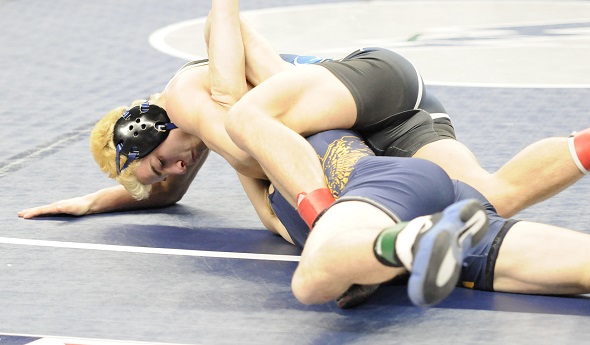
Trombley Aims to Make More Mat History
By
Paul Costanzo
Special for MHSAA.com
February 28, 2018
Typically, distractions in sports are seen as a bad thing.
 For Lake Fenton senior wrestler Jarrett Trombley, however, setting the goal of breaking the state’s single-season takedown record was the perfect distraction to keep his mind off chasing a fourth straight MHSAA individual title.
For Lake Fenton senior wrestler Jarrett Trombley, however, setting the goal of breaking the state’s single-season takedown record was the perfect distraction to keep his mind off chasing a fourth straight MHSAA individual title.
“It’s something else to think about other than state,” he said. “It was just a goal I had, and I just went out there and wrestled every single match the best I could, tried to get as many takedowns as I could, and tried to be as dominant as I can be. I was just taking it match by match, and that has taken a little bit away from the whole four-time state title thing.”
The “four-time state title thing” is now next on Trombley’s to-do list, as the MHSAA Individual Wrestling Finals begin Friday at Ford Field in Detroit. Trombley, who wrestles at 130 pounds, will look to become the 23rd wrestler in state history to accomplish the feat. He and Dundee’s Brandon Whitman, also in Division 3, both will attempt to finish the achievement.
“The message this week, and we’re going over it now, is to work hard and do your job,” Lake Fenton coach Vance Corcoran said. “Everyone has trained their whole lives for this. It’s been a long season, and you’ve done your job in this room; now it’s time to do your job on the mat. Dominate and attack, and do what he’s done all season.”
Trombley has certainly been dominant while attacking all season, averaging more than 10 takedowns per match on his way to a 55-0 record through the Regional tournament. His 565 takedowns is well beyond the previous MHSAA record of 526 set by Jake Bohn of East Kentwood in 2007-08, which has stood as the National Federation record as well. He has also surpassed the 559 set by Karson Hill of Trenton High School in Missouri in 2007-08, the previous high according to another national record book maintained by wrestlingusa.com.
It may have served as a distraction, but it’s also helped make Trombley a better wrestler and a better conditioned athlete, as it’s forced him to work on things within a match and stay on the mat longer than he would with a quick pin. He does, he said, work for the pin eventually to get as many team points as possible.
“All of the takedowns helped me get in better shape and have better conditioning,” said Trombley, who is ranked 10th in the country at 132 pounds by FloWrestling. “It’s helped me in my matches.”
Now, though, Corcoran said it’s time to focus solely on winning, and doing so as soon as the opportunity presents itself.
“Coming up to the state meet, if he gets the chance to put a guy on his back, he isn’t going to let him up,” Corcoran said.
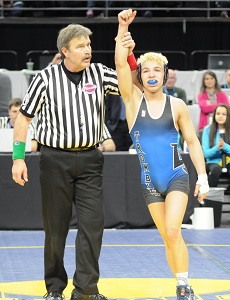 Trombley – who has won Division 3 titles at 112, 119 and 130 pounds – doesn’t need reminders that even three-time champions can be vulnerable when going for their fourth. To win his second title in 2016, Trombley defeated Grand Rapids Catholic Central’s Devin Schroder – denying the three-time champ Schroder a fourth title.
Trombley – who has won Division 3 titles at 112, 119 and 130 pounds – doesn’t need reminders that even three-time champions can be vulnerable when going for their fourth. To win his second title in 2016, Trombley defeated Grand Rapids Catholic Central’s Devin Schroder – denying the three-time champ Schroder a fourth title.
“It keeps my mind in focus every day in the practice room,” Trombley said. “It can just as easily happen to me. There’s a state champ on my bracket this year, and a few others that are really good.”
The win against Schroder, who is now wrestling at Purdue University, was big for Trombley beyond simply winning his second MHSAA Finals title.
“Before that I hadn’t really wrestled any stellar competition in high school, per se,” Trombley said. “He was the talk of the state for two or three years, so I had to be confident going into that match, and I was confident. After I did win, it kind of changed things. I didn’t know he was nationally ranked until I had beat him. I was nationally ranked after that, so I just kind of worked even harder. I kind of proved to myself that I can beat anyone if I work hard.”
As colleges began courting Trombley, one started to stick out -- North Carolina State. He signed with the Wolfpack this past November.
“The coaching staff just made me feel welcome, and I felt like I could live there,” said Trombley, who has an older brother who lives in North Carolina. “They were just a really friendly coaching staff and they have some really nice credentials. It’s a program on the up rise, and I felt like I could succeed there.”
Trombley believes his wrestling style will translate well to the college level. For now, though, he’s focused on finishing up his high school career the right way, and so is everyone around him.
“Jarrett is just one of those kids that he never quits,” Corcoran said. “His work ethic is through the roof; he’s focused and he’s determined. He’s from a great wrestling family, he’s super grounded, and if you hear anyone say anything about Jarrett as a four-timer, his mom is right there to say, ‘You have to win one more.’
“He understands that nothing is given to you, that you have to earn it.”
 Paul Costanzo served as a sportswriter at The Port Huron Times Herald from 2006-15, including three years as lead sportswriter, and prior to that as sports editor at the Hillsdale Daily News from 2005-06. He can be reached at [email protected] with story ideas for Genesee, Lapeer, St. Clair, Sanilac, Huron, Tuscola, Saginaw, Bay, Arenac, Midland and Gladwin counties.
Paul Costanzo served as a sportswriter at The Port Huron Times Herald from 2006-15, including three years as lead sportswriter, and prior to that as sports editor at the Hillsdale Daily News from 2005-06. He can be reached at [email protected] with story ideas for Genesee, Lapeer, St. Clair, Sanilac, Huron, Tuscola, Saginaw, Bay, Arenac, Midland and Gladwin counties.
PHOTOS: Lake Fenton's Jarrett Trombley works toward his third MHSAA championship during last season's title match at 130 pounds. (Middle) Trombley's arm is raised after his second Finals title, in 2016. (Click for more from HighSchoolSportsScene.com.)
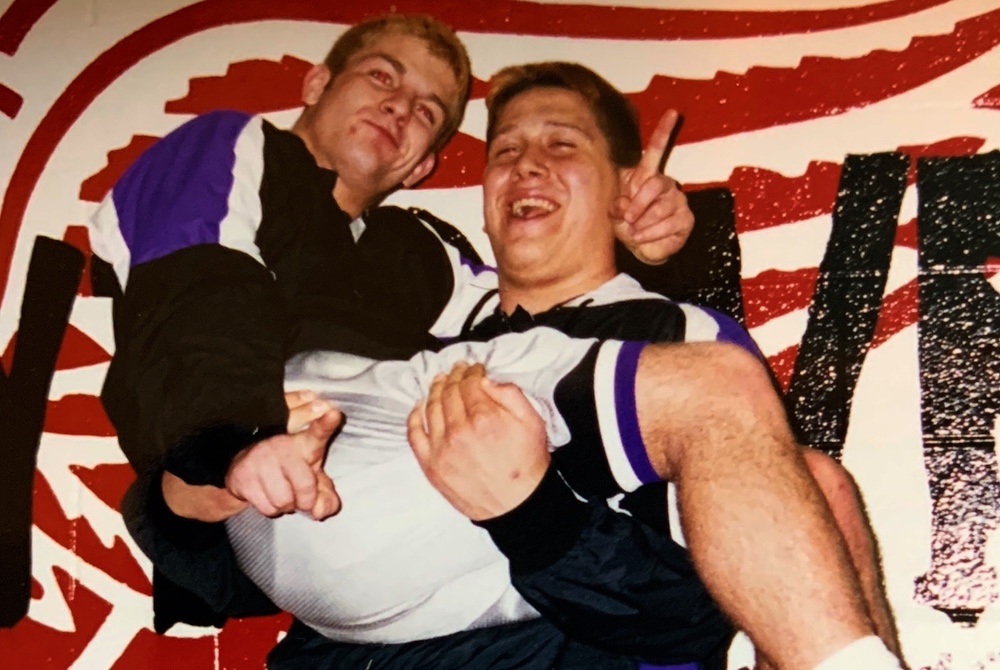
Caro Champs Find Common Ground Again as Mental Health Providers
By
Paul Costanzo
Special for MHSAA.com
July 8, 2021
Phil Millerov and Phil Niklowicz wanted to do more than simply defeat opponents when wrestling at Caro High School.
They wanted to dominate – physically and mentally.
 “We had this thing between us where we wanted to be done, and (opponents) didn’t want to come back on the mat with us,” Millerov said.
“We had this thing between us where we wanted to be done, and (opponents) didn’t want to come back on the mat with us,” Millerov said.
Twenty years later, both spend their days building people up. Millerov is a licensed professional counselor, while Niklowicz is a licensed therapist.
“I went out there looking to dominate and make sure it was known that I am the superior wrestler in all facets,” Niklowicz said. “I would try to run up as many points as fast as I can. I would teach the same thing when coaching, specifically with my nephew. You’re saying, ‘Listen, we want to break these people.’ Then the next day, in a therapy session, it’s like, ‘Let’s build up your self-esteem and set some goals to boost ourselves up.’”
The close friends and two faces of Caro’s surging wrestling program in the late 1990s now have very similar careers. Millerov – who finished second, third and first at 275 pounds in the 1998, 1999 and 2000 MHSAA Finals, respectively -- works in private practice at Transitions Counseling Service in Greenville, where he specializes in substance abuse disorders. He also has served as a Class 1 Fellow at the WK Kellogg Foundation.
Niklowicz – a two-time MHSAA Finals champion (1999 and 2000) and four-time placer – is working in private practice in Southfield, seeing mostly children. He also works in adult foster care with patients who have had traumatic brain injuries.
“He and I went and hiked Pictured Rocks at the beginning of May,” Millerov said. “And we joked about how nobody would have guessed that we’d be doing this now.”
That Millerov and Niklowicz are still close does not come as a surprise. Their friendship began when their wrestling careers did, as 6-year-olds in the Caro Growlers program. As they were becoming two of the state’s top wrestlers, they would share rides to tournaments, and their families grew close.
In high school, despite their size difference – Niklowicz wrestled at 135 his senior year – it wasn’t uncommon to see them warming up together.
“We were definitely easy going and liked to mess around a lot,” Niklowicz said. “We used to mess around before meets and throw each other. He would jump and I would throw him. People would look at us like, ‘Why is that little guy throwing that big guy?’”
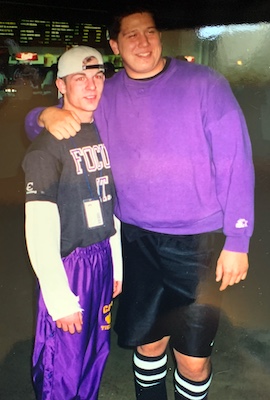 While their teams never made it out of the Regional, Millerov and Niklowicz helped set the stage for a program that would become among the best in Division 3 throughout the 2000s, qualifying for five straight Quarterfinals from 2003-07 and winning the Division 3 Finals title in 2003.
While their teams never made it out of the Regional, Millerov and Niklowicz helped set the stage for a program that would become among the best in Division 3 throughout the 2000s, qualifying for five straight Quarterfinals from 2003-07 and winning the Division 3 Finals title in 2003.
Individually, they were among the most well-known and feared wrestlers in the state.
“Niklowicz and I were fortunate to have each other, because we pushed each other,” Millerov said. “We were in constant competition with each other and ourselves. Just to kind of push each other, it was a great thing.”
Niklowicz finished fifth as a freshman and third as a sophomore before winning back-to-back titles to close out his career. In 1999, he defeated Nick Oertel of Goodrich 9-2 in the 125-pound final, and the next year he defeated Oertel’s teammate, Ryan Tripp, 7-5 at 135. Tripp would go on to win an individual title the following year. Niklowicz would finish his career with 214 victories.
“I think probably both (Finals titles) were equal,” Niklowicz said. “I think there was probably a little more stress going into my senior year. My motivation always came from improving, then it was maintaining the state title. You don’t want to go the opposite direction.”
Millerov lost a tight 6-4 decision against Remus Chippewa Hills’ Bob Kozlowski in the MHSAA Finals as a sophomore, and had an epic 12-10 match against future NFL defensive lineman Jason Babin of Paw Paw in the 1999 semifinals before fighting back to take third. The next year, he won his title via first-period pin against Dan Kliphuis, a two-time runner-up from Grand Rapids West Catholic. Millerov finished with 196 career wins and set the state record for pins in a career (160), which was broken the next season by Nick Simmons of Williamston and is now held by Justin Zeerip of Hesperia. The 56 pins Millerov recorded his senior season remains second all-time to Simmons, who had two seasons with 57.
“I never really thought about (the pin record) to be quite honest,” Millerov said. “It was just kind of in the background. It didn’t matter; all I cared about was winning this match, and I wanted to do it in the most effective, efficient way I could.”
They both continued their wrestling careers, but went their separate ways in college, with Millerov heading to Neosho County Community College in Kansas and Niklowicz to Virginia Tech.
Millerov had interest from several Division I schools coming out of high school, including some in the Big Ten, but he admits his grades weren’t good enough at the time. Neosho provided a chance to compete with some of the best in the country while at the junior college level, however, as the team took second at the National Junior College Athletic Association championships in 2002.
He transferred to Central Michigan after his sophomore year, joining his girlfriend – now his wife – who was already attending, and walking onto the wrestling team. While his relationship lasted, wrestling did not.
“I was distracted,” Millerov said. “My grandmother passed away in 2002 in that summer. I was trying to get that motivation back, and I just lost it. There has to be that edge with wrestling. When things didn’t work out, I struggled. Wrestling was my identity.”
Millerov was working to follow in his father’s footsteps and become a police officer. But the elder Phil Millerov, who died in 2012, talked his son out of it.
“Looking back on it, for me, it was obviously the right decision,” Millerov said.
The idea to go into counseling came after Millerov was married in 2006, as his wife had gotten into the program. He went back to school to earn his bachelor’s degree from CMU in 2007, and would go on to get his master’s from CMU, as well.
“I had taken a bunch of psychology courses just because I liked the field,” Millerov said. “I liked to be challenged. I liked puzzles, and with psychology, it’s like a new puzzle every hour. It just clicked. I flew through and graduated with like a 3.8. I was like, ‘Wow, I kind of feel smart.’ It was good to find something I was passionate about again.”
Millerov said he’s constantly learning and honing his craft, much like he did as a wrestler. A major difference now, however, is that he’s found more balance in his life.
“I think about working with athletes in addiction, I find a lot of similarities,” he said. “Wrestling was my life, it’s how I identified myself. I hear that same kind of talk around people struggling with addiction. One you’re considered successful for, the other you’re not. Most of my growth has been around finding balance. I find that my happiness and my clients’ as well, is when we found that balance instead of being good at just one thing. I want you to have passion, I want you to do things you love, but I also want you to be effective as a husband, a father, whatever other responsibilities you have.”
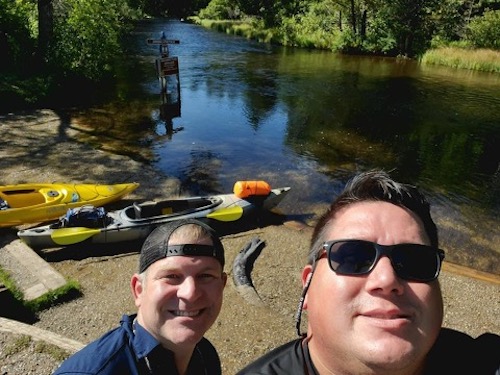 Niklowicz’s journey to becoming a therapist was more telegraphed, as both of his parents work in mental health, and he said it was always something he wanted to do, as well.
Niklowicz’s journey to becoming a therapist was more telegraphed, as both of his parents work in mental health, and he said it was always something he wanted to do, as well.
He attended Virginia Tech on a wrestling scholarship, but transferred to Eastern Michigan after one year. The Hokies had recruited him to wrestle at 133 pounds, but when the team’s 125-pounder was injured, Niklowicz was asked to cut down further. Like Millerov, he struggled when his wrestling career ended.
“I just had a really bad taste in my mouth after leaving Virginia Tech and trying to cut all this weight,” he said. “Some of it was I had lost the desire to work out, to wrestle. Fifteen years, roughly, of my life was dedicated to wrestling, and once you stop, what do I do with my winters? What do I do with seven months of the year? It was definitely a part of my identity; that’s why I got into coaching. I did MMA fighting for a little bit to have something competitive.”
Like Millerov, Niklowicz said finding balance was important.
“In the mental health field, specifically, there’s a lot of burnout for people,” he said. “Every day, you’re listening to people talking about their problems, but at the same time, they’re coming for a reason and they’re there for help, so you have to provide that help and have to motivate yourself to come to the office every day and give it your best. I try to instill the motivation that I used to other people.”
When Niklowicz looks at his time as an athlete compared to his work as a therapist, he said that work ethic is the main characteristic that has carried over.
“I think my practice mentality was the same as it was on the mat,” he said. “Even in the wrestling room, these are people I’m friends with, people I grew up with, and I still didn’t want anyone to score on me. Then you just look at your work ethic outside of wrestling, whether you’re studying for exams or motivating yourself to get up and go to class.”
While they are no longer living in the same town or living similar lives – Millerov is married with three kids, while Niklowicz is single – the connection between Caro’s dominant duo remains strong, both professionally and personally.
“I don’t think we ever thought we would be going down such a similar path, and I doubt that either one of us grew up thinking we would do the exact same thing,” Niklowicz said. “We met when we were 6 years old, and we’ve been best friends forever. I think it’s hilarious that we’ve taken such similar paths but with some glaring differences. It’s definitely interesting that we’re still really good friends after 30-some years, especially since we’ve moved on and gone our separate ways.”
2020-21 Made in Michigan
June 28: Michigan's Minor Leaguers Making Up for Lost Season - Read
PHOTOS: (Top) Caro’s Phil Millerov lifts teammate Phil Niklowicz as both celebrate Division 3 championships during the 2000 Individual Finals at Joe Louis Arena. (Middle) Niklowicz, left, and Millerov were high school warm-up partners despite wrestling at significantly different weights. (Below) Niklowicz and Millerov take a selfie during a hiking trip to Pictured Rocks National Lakeshore in May. (Photos courtesy of Niklowicz and Millerov.)

